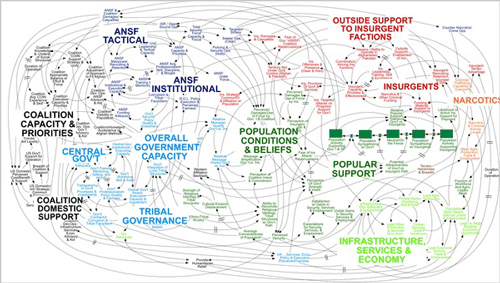 A wise economist that I met recently tipped me off that I would find the latest Army field manual interesting reading. He was more than right about that. The 2009 US ARMY STABILITY OPERATIONS FIELD MANUAL (available in a University of Michigan paperback as well as an earlier version online ) is remarkably full of utopian dreams of transforming other societies into oases of prosperity, peace, and democracy through the coordinated use of military force, foreign aid, and expert knowledge.
A wise economist that I met recently tipped me off that I would find the latest Army field manual interesting reading. He was more than right about that. The 2009 US ARMY STABILITY OPERATIONS FIELD MANUAL (available in a University of Michigan paperback as well as an earlier version online ) is remarkably full of utopian dreams of transforming other societies into oases of prosperity, peace, and democracy through the coordinated use of military force, foreign aid, and expert knowledge.
My usual MO is to ridicule such documents. But my wells of satire are starting to run dry after years of deployment against utopians like Jeffrey Sachs and Paul Collier. More in sorrow than in anger, I see the utopian social engineering craze might affect actions of people with guns. I am sad for Iraqis and Afghans that the U.S. Army is operating in their countries guided by such misguided ideas.
To document a little of what seems utopian, the foreword by Lieutentant General William B. Caldwell IV, Commander, US Army Combined Arms Center, says:
we will …defeat insurgency, assist fragile states, and provide vital humanitarian aid to the suffering. …. to promote participation in government, spur economic development, and address the root causes of conflict among the disenfranchised populations of the world….{with} a comprehensive approach to stability operations that integrates the tools of statecraft with our military forces, international partners, humanitarian organizations, and the private sector.
The Manual, with a foreword by Under Secretary of Defense for Policy Michèle Flournoy, says the US Army will be
leveraging the coercive…force to establish a safe and secure environment; …establish political, legal, social, and ….economic institutions; and help transition responsibility to a legitimate civil authority {my emphasis} operating under the rule of law…. toward long-term developmental activities where military forces support broader efforts in pursuit of national and international objectives.
The definition of a legitmate civil authority is then given:
Respects freedom of religion, conscience, speech, assembly, association, and press. Submits to the will of the people, especially when people vote to change their government. Maintains order within its own borders, protects independent and impartial systems of justice, punishes crime, embraces the rule of law, and resists corruption. Protects the institutions of civil society, including the family, religious communities, voluntary associations, private property, independent businesses, and a market economy.
Even in the most dysfunctional societies (“fragile states”):
national strategy aims to—Promote freedom, justice, and human dignity while working to end tyranny, to promote effective democracies, and to extend prosperity through free trade and wise development policies.
Who is going to do all this? The US Army is going to be assisted by other US government agencies, intergovernmental organizations, nongovernmental organizations, international and region organizations and the private sector, i.e people who have different approaches, different objectives, different incentives, and answer to different bosses, with no credible mechanism for coordination (the Manual suggests a “Civil-Military Operations Center”)
The danger is that, if put into practice, such delusions create excessive ambition, which creates excessive use of military force, which kills real human beings, Afghans and Iraqis.
US Army and Defense Department thinkers – please go back to the drawing board. Think about American values that guide us at home. These values don’t include utopian social engineering, and certainly not by outside armies.
 From Aid to Equality
From Aid to Equality





 Levi’s has a new ad campaign that suggests American liberty is still a work in progress. One of its new videos has a voiceover reciting the Walt Whitman poem “O Pioneers” with youths dancing around a fire wearing Levi’s. [Watch video here:
Levi’s has a new ad campaign that suggests American liberty is still a work in progress. One of its new videos has a voiceover reciting the Walt Whitman poem “O Pioneers” with youths dancing around a fire wearing Levi’s. [Watch video here:  There is an
There is an  A wise economist that I met recently tipped me off that I would find the latest Army field manual interesting reading. He was more than right about that. The 2009 US ARMY STABILITY OPERATIONS FIELD MANUAL (available in a
A wise economist that I met recently tipped me off that I would find the latest Army field manual interesting reading. He was more than right about that. The 2009 US ARMY STABILITY OPERATIONS FIELD MANUAL (available in a